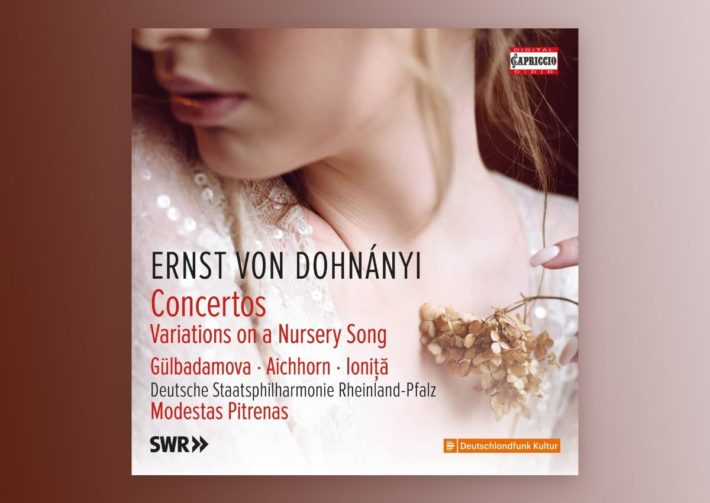Capriccio continues its exploration of the still under-appreciated Hungarian composer Ernst von Dohnányi. This is the sixth release in the ongoing series, the best of which have featured this pianist (a solo recital released in 2018), orchestra and conductor (their riveting performance of the first symphony, released in 2019). This latest release is perhaps finer still.
Dohnányi’s “Variations on a Nursery Song” is surely his best-known work, and this performance certainly demonstrates why. The orchestral introduction has tremendous ferocity, with commanding timpani and wailing brass, creating an expectation of high-minded seriousness – but the piano answers with a simple statement of the theme (“Twinkle, twinkle, little star” in America) that any first-year piano student could play. A moment of wit and humor of which Haydn would be proud.
But Dohnányi’s music quickly becomes far more complex, and pianist Sofja Gülbadamova has its full measure. Listen to how deftly she handles the technical demands of each variation: the acrobatic exploration of the first, the gossamer filigree of variation 5, or the gorgeous lyricism she (and the orchestra) achieves in variation 10’s Passacaglia. More impressive still is the sense of collaboration, of give and take between Gulbadamova and the orchestra: a wonderful example is heard in the fourth variation, as Gulbadamova deftly assumes her role as accompanist to the mischievous woodwinds. The chamber music like intimacy heard here rivals, and indeed often exceeds what is heard in the Shelley/Bamert/BBC Philharmonic performance on Chandos. On the manuscript the composer wrote: “For the enjoyment of friends of humor, to the annoyance of others.” This performance perfectly captures the subtle irony and hilarity of that description.
Related Posts
- Review: Ammann, Ravel, Bartók – Piano Concertos – Haefliger, Helsinki Philharmonic, Mälkki
- Review: Edgar Moreau Plays Offenbach and Gulda Cello Concertos
- Review: “Toccata” – Elisa Netzer, Harp
“Concertino for Harp & Orchestra” inhabits a completely different world, its harmonies somewhat impressionistic, the orchestral texture lighter and more refined. There are numerous wind solos – sample the horn solo at 2’10” in the first movement, followed by a blossoming melody in the strings. At 3’37” there is a sudden change in mood, anxious and searching but it soon returns to its original calm state. Indeed, another strength of these performances is how completely soloists and orchestra inhabit and impart each emotional change in the music. This is playing of great sensitivity. The Allegro vivace second movement has a tangible sense of play between soloist and orchestra, and the myriad colors Dohnányi creates is consistently impressive, as is his care to never overwhelm the soloist. The third movement Adagio explores a darker, more forlorn emotional vein, Dohnányi’s lyricism again to the fore (listen to the writing for oboe in the opening minute).
The album ends with the “Konzertstück” for cello and orchestra and features lovely melodic writing that allows cellist Andrei Ioniţă to sing with fervor and richly burnished tone. The earliest work on the disc (written in 1903/04), the harmonic writing reflects Dohnányi’s study of, and admiration for, Brahms and Schumann, while in the final movement I was often reminded of Strauss. There is little confrontation between soloist and orchestra – this is music where the forces again work cooperatively. Development of the first movement’s opening theme is particularly impressive, and when the same melodic material reappears in the slow second movement, there is a sense of emotional catharsis. A distinguishing aspect of the writing is heard in the third movement’s cadenza, which is accompanied by the orchestral cello section. Loniţă’s tone and phrasing are often breathtakingly beautiful, and Modestas Pitrenas proves to be an exceptionally attentive accompaniment in all three works.
In such satisfactory performances, one is left to wonder why we do not hear these works on the concert stage more often. Their gorgeous orchestration and bountiful songfulness are thrillingly realized here, and I would imagine anyone hearing this music will want to explore more of the Capriccio series. There is also an excellent series on Chandos, made by the BBC Philharmonic led by Matthias Bamert, that is now a few decades old. The Chandos recordings tend to be beefier and more opulent, but I find the detail and passion of Pitrenas’ accompaniments more engaging, and the Capriccio recording has plenty of impact. I look forward to future releases in this series.

Review: Dohnányi – Concertos, Variations on a Nursery Song
Sofja Gülbadamova – Piano
Silke Aichhorn – Harp
Andrei Ioniţă – Cello
Deutsche Staatsphilharmonie Rheinland-Pfalz
Modestas Pitrenas – Conductor
Capriccio, CD C5463
Recommended Comparisons
Read more classical music reviews or visit The Classic Review Amazon store











